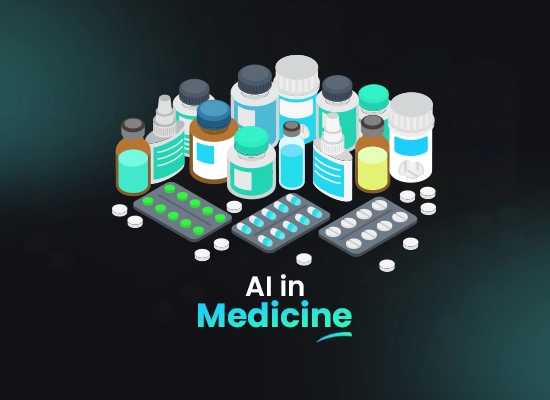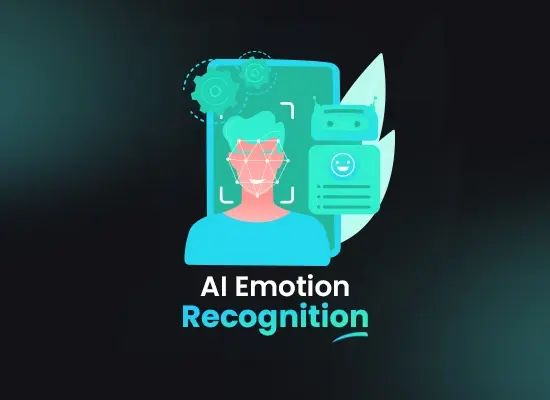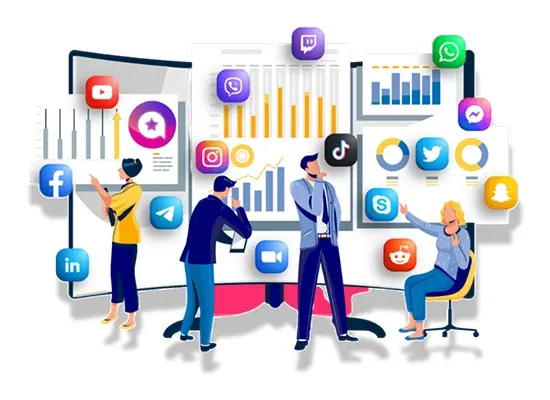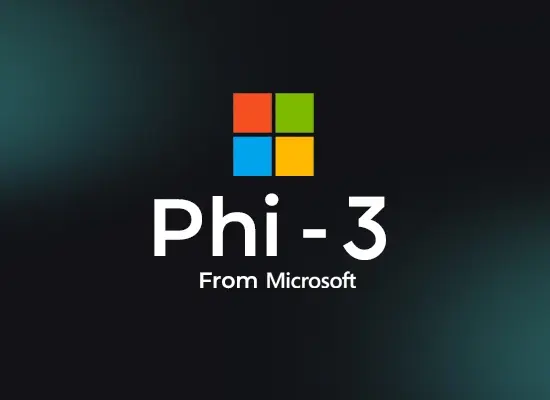AI in Automated Marketing – Making Marketing Smarter with AI from Droids to Dollars
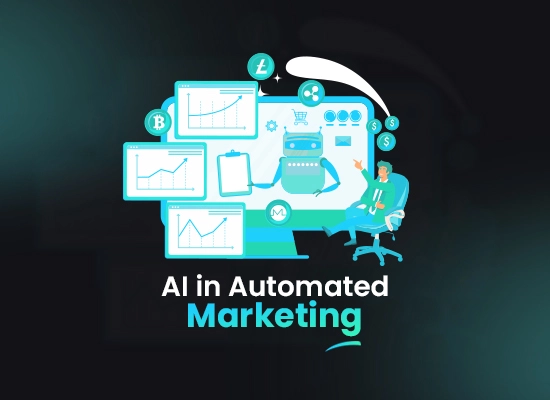
The marketing landscape is evolving rapidly, and AI is at the forefront of this change. AI-powered automated marketing is revolutionising the way businesses reach and engage customers. By leveraging data, algorithms, and machine learning, this technology streamlines tasks, personalises experiences, and optimises campaigns, leading to improved efficiency, increased engagement, and ultimately greater business success.
What is Automated Marketing?
Automated marketing utilises Artificial Intelligence (AI) to streamline and personalise customer interactions across various channels. This encompasses tasks like email marketing, social media engagement, and advertising campaigns. By leveraging data and algorithms, automated marketing empowers businesses to:
Personalise content:
AI analyses customer behaviour and preferences, allowing automated systems to tailor messages and recommendations for each individual. This significantly enhances engagement and conversion rates.
Optimise campaigns:
AI in marketing helps analyse campaign performance in real-time, enabling continuous optimisation for better results. Automated systems can adjust budgets, target audiences, and even ad creatives based on data-driven insights.
Automate repetitive tasks:
Tedious tasks like scheduling social media posts, sending personalized emails, or managing lead nurturing sequences are easily handled by automation, freeing up marketing teams to focus on strategic initiatives.
One specific example of artificial intelligence in advertising examples is the use of automated pricing tools. These tools analyse market trends, competitor pricing, and customer demand to suggest optimal pricing strategies in real-time. This ensures businesses stay competitive and maximise revenue opportunities.
Overall, automated marketing powered by AI in advertisements is transforming the marketing landscape. By automating repetitive tasks, personalising interactions, and optimising campaigns, businesses gain a significant advantage in reaching and engaging their target audiences.
Seamless Collaboration | Cost-Efficient Solutions | Faster Time-to-Market

Evolution of Automated Marketing and the Role of AI:
Automated marketing has undergone a significant transformation, driven by AI integration in marketing. While its journey began with automating basic tasks like email scheduling and social media posting, it has evolved into a powerful tool for personalised engagement and campaign optimisation.
Early iterations of automated marketing focused on streamlining repetitive tasks, freeing up human resources for more strategic work. This initial wave introduced features like:
Automated Email Sequences:
Triggered by specific customer actions or events, these sequences nurture leads and maintain customer engagement.
Social Media Scheduling:
Tools allow scheduling posts in advance, saving time and ensuring consistent brand presence on social media platforms.
However, the true revolution arrived with the integration of Artificial Intelligence. This led to the emergence of advanced functionalities like:
Personalisation:
AI analyses customer data to tailor content, recommendations, and offers to individual preferences. This significantly improves customer experience and conversion rates.
Predictive Analytics:
AI algorithms predict customer behaviour and identify high-potential leads, allowing targeted marketing efforts and increased ROI.
Real-Time Optimisation:
AI continuously analyses campaign performance and identifies areas for improvement, enabling real-time adjustments for better results.
Examples include the use of chatbots powered by AI for personalised customer service interactions. These chatbots can answer basic queries, resolve common issues, and even qualify leads, freeing up human agents for more complex tasks.
Furthermore, AI in marketing has led to the development of sophisticated tools like automated pricing tools. These tools analyse market data, competitor pricing, and customer demand to suggest optimal pricing strategies in real-time. This ensures businesses stay competitive and maximise revenue opportunities.
Benefits of AI in Advertising
The integration of AI in marketing has revolutionised the way businesses approach customer engagement and campaign management. AI-powered automated marketing offers a plethora of benefits, empowering businesses to:
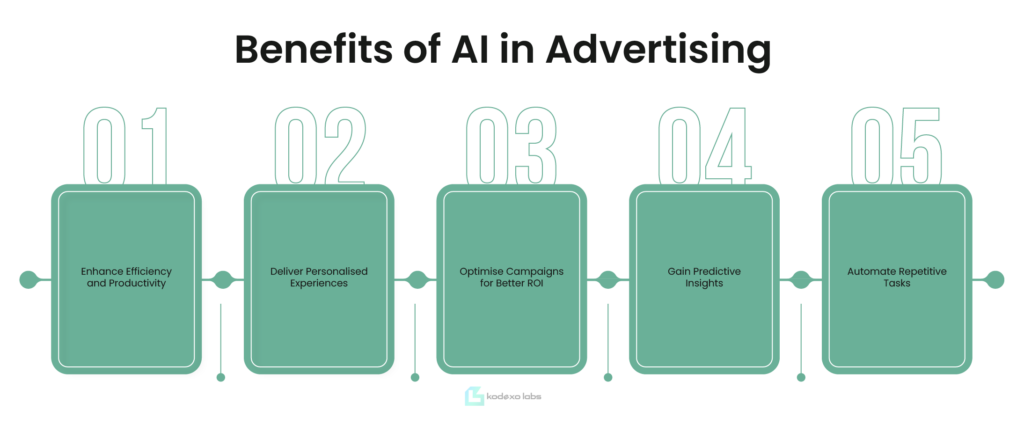
Enhance Efficiency and Productivity:
Repetitive tasks like scheduling social media posts, sending personalised emails, and managing lead nurturing sequences are automated, freeing up valuable time for marketing teams. This allows them to focus on strategic initiatives, content creation, and campaign analysis.
Deliver Personalised Experiences:
By leveraging customer data and preferences, automated advertisement allows for AI content recommendation. This caters to individual needs and interests, leading to higher engagement and conversion rates.
Optimise Campaigns for Better ROI:
AI in marketing continuously monitors campaign performance, providing valuable insights into what works and what doesn’t. This allows for data-driven adjustments to budgets, target audiences, ad creatives, and pricing strategies, ensuring optimal return on investment (ROI).
Gain Predictive Insights:
AI can analyse vast amounts of data to predict customer behaviour and future trends. This allows businesses to anticipate customer needs, personalise marketing strategies, and develop targeted campaigns that resonate more effectively.
Automate Repetitive Tasks:
Tasks like managing automated pricing tools, analysing customer reviews, and generating reports can be automated using AI. This reduces human error and frees up resources for more strategic endeavours.
Examples of automated advertisement include automated ad generation, chatbots for customer service, and dynamic pricing tools. These advancements streamline processes, personalise interactions, and ultimately yield better marketing outcomes.
Data-driven Marketing: Leveraging AI for Insights and Analysis
In today’s data-rich world, successful marketing hinges on the ability to translate information into actionable insights. Data-driven marketing utilises a strategic approach that leverages customer data, market trends, and AI in marketing to inform and optimise marketing efforts.
At the core of this approach lie data collection and analysis. Businesses gather data from various sources, including website analytics, customer relationship management (CRM) systems, and social media engagement. However, raw data alone holds limited value. This is where AI comes into play.
AI-powered tools and algorithms analyse vast amounts of data, uncovering hidden patterns, trends, and customer preferences. These insights empower marketers to:
Personalise Customer Experiences:
By understanding individual needs and behaviours, AI enables the creation of personalised content, recommendations, and marketing messages. This fosters deeper customer engagement and loyalty.
Target The Right Audience:
AI can segment customer data based on demographics, interests, and purchase history. This allows marketers to target specific audiences with laser focus, maximising campaign effectiveness and return on investment (ROI).
Optimise Marketing Campaigns:
AI in marketing tools analyses campaign performance in real-time, providing valuable insights into what’s working and what’s not. Marketers can then adjust strategies, budgets, and messaging based on data-driven insights for continuous improvement.
One example of AI in advertising examples is the use of automated pricing tools. These tools leverage AI to analyse customer behaviour, market trends, and competitor pricing, allowing businesses to set optimal prices that maximise revenue and customer satisfaction.
Data-driven marketing, powered by AI, empowers businesses to move beyond guesswork and intuition. By harnessing the power of data and AI, companies can gain deeper customer understanding, make informed decisions, and ultimately achieve their marketing goals.
Predictive Analytics in Automated Marketing Campaigns:
In the realm of automated marketing, predictive analytics emerges as a powerful tool, harnessing the power of AI in marketing to anticipate customer behaviour and personalise campaigns with remarkable accuracy. This technology analyses vast amounts of historical data, including customer demographics, purchase history, and online behaviour, to identify patterns and predict future actions.
Imagine an AI in advertising example where a customer browsing for running shoes is presented with a targeted ad for a specific brand based on their previous searches and purchase history. This is the magic of predictive analytics in action. Let’s delve deeper into how this technology transforms automated marketing campaigns:
Personalised Product Recommendations:
Predictive analytics empowers systems to recommend products that customers are most likely to be interested in, based on their past behaviour and similar customer profiles. This significantly boosts customer engagement and conversion rates.
Dynamic Content and Offers:
By anticipating customer needs and preferences, AI in advertising can adjust website content, email offers, and ad creatives in real-time, ensuring each customer receives the most relevant and compelling message. This personalised approach fosters deeper customer connections and brand loyalty.
Optimised Campaign Targeting:
Predictive analytics helps identify the right audience segments for different marketing campaigns. This allows businesses to allocate resources efficiently and maximise the reach and impact of their advertising efforts.
AI in marketing tools like automated pricing tools can benefit from predictive analytics as well. By analysing customer behaviour and market trends, these tools can not only suggest optimal pricing strategies but also predict future demand fluctuations, allowing businesses to adjust their pricing accordingly and maintain a competitive edge.
In essence, predictive analytics acts as a crystal ball for automated marketing campaigns, offering valuable insights into customer behaviour and future trends. By leveraging this powerful technology, businesses can personalise interactions, optimise campaigns, and ultimately achieve greater marketing success.
AI in Advertising Examples:
AI in advertising is no longer a futuristic concept; it’s actively reshaping the way brands connect with their audiences. From delivering personalised experiences to optimise campaign performance, numerous AI in advertising examples show-case its transformative power.
One prominent example lies in personalised advertising. Imagine a world where you only see ads relevant to your interests and needs. AI, analysing your browsing history and online behaviour, can tailor add content to resonate with your preferences. This significantly increases engagement and conversion rates compared to traditional, generic advertising.
Another compelling example is dynamic creative optimization. AI in marketing allows for on-the-fly adjustments to ad creatives, such as headlines and visuals, based on audience response. This ensures the most effective ad variations are displayed to specific user segments, leading to better campaign performance and an improved return on investment.
AI in advertising examples extend beyond just the creative aspects. Automated pricing tools utilise AI to analyse market trends, competitor strategies, and customer demand in real-time. This allows businesses to dynamically adjust pricing for their products or services, ensuring they stay competitive and maximise revenue opportunities.
These are just a few examples of how AI in advertising is revolutionising the marketing landscape. As AI technology continues to evolve, we can expect even more innovative and effective AI in advertising examples to emerge, shaping the future of how brands connect with consumers.
Automated Pricing Tools Available in the Market:
In today’s dynamic market, staying competitive often hinges on effective pricing strategies. This is where automated pricing tools come into play. These powerful tools, driven by AI in marketing, take the guesswork out of pricing by leveraging data and algorithms to optimise prices in real-time.
One key benefit of automated pricing tools is their ability to react swiftly to market fluctuations. By continuously monitoring competitor pricing, customer demand, and even factors like weather patterns (think ice cream prices soaring during a heatwave!), these tools can suggest adjustments to ensure your products remain competitively priced. This can lead to increased sales and improved profit margins.
These tools go beyond simply reacting to external factors. Some automated pricing tools incorporate AI in advertising by analysing customer behaviour and purchasing patterns. This allows them to tailor pricing strategies to specific customer segments, maximising the value they perceive for different products.
Furthermore, automated pricing tools can streamline the pricing process, saving businesses valuable time and resources. Imagine no longer needing to manually monitor competitor prices or adjust your pricing on every platform you sell on. These tools handle the heavy lifting, freeing you to focus on other aspects of your business.
Whether you are a small business owner or a large enterprise, automated pricing tools offer a compelling solution for staying competitive and maximising your revenue potential. By leveraging the power of AI in marketing, these tools can help you make informed pricing decisions that drive success.
Marketing Automation Platforms and AI Integration:
The world of marketing is constantly evolving, and the integration of Artificial Intelligence (AI) into Marketing Automation Platforms (MAPs) is driving significant change.
Marketing Automation Platforms streamline repetitive tasks like email marketing, social media management, and lead nurturing. By automating these functions, they free up valuable time for marketers to focus on strategic initiatives. However, MAPs are becoming even more powerful through their integration with AI. AI brings new capabilities to MAPs, allowing them to:
Personalise Customer Experiences:
AI analyses customer data and behaviour to personalise marketing messages, offers, and recommendations. This fosters deeper engagement and increases customer satisfaction.
Predict customer needs:
AI can predict customer behaviour and needs, allowing businesses to proactively deliver relevant content and offers at the right time. This significantly improves conversion rates and sales.
Optimise Marketing Campaigns:
AI continuously analyses campaign data and suggests real-time adjustments for better performance. This ensures campaigns are constantly optimised for maximum impact.
The integration of AI into MAPs is still evolving, but the potential benefits are undeniable. By combining the automation of Marketing Automation Platforms with the intelligence of AI, businesses are gaining a significant edge in today’s competitive marketing landscape.
How is Generative AI Useful for Marketing?
Generative AI, a branch of artificial intelligence capable of creating new and original content, is rapidly reshaping the marketing landscape. Its potential applications span across various marketing tasks, offering significant benefits and opening doors to innovative strategies.
One major area of impact is content creation. Generative AI can be used to create various forms of content, including social media posts, blog articles, product descriptions, and even scripts for video ads. This not only saves marketers considerable time and resources but also allows them to explore a wider range of content formats and experiment with different styles and tones.
Furthermore, generative AI excels in personalisation. By analysing customer data and preferences, it can tailor content and marketing messages to resonate with individual audiences. This targeted approach fosters deeper engagement and increases the likelihood of conversions. For instance, imagine generating personalised email recommendations based on a customer’s past purchases or browsing behaviour.
Generative AI development also holds immense potential for enhancing creativity. It can assist with brainstorming new ideas, generating variations on existing content, and even creating entirely new content formats. This unlocks possibilities for innovative marketing campaigns that capture attention and leave a lasting impression on audiences.
Finally, generative AI can be used to optimise marketing efforts. By analysing the performance of different types of content and their impact on various audiences, it can provide valuable insights for refining strategies and maximising return on investment. This data-driven approach allows marketers to continuously improve their campaigns and achieve better results
Optimising Ad Campaigns with AI and Machine Learning:
In today’s dynamic advertising landscape, maximising campaign performance hinges on precise targeting, efficient spending, and continuous improvement. This is where AI (Artificial Intelligence) and machine learning (ML) come into play, offering powerful tools to optimise ad campaigns and achieve remarkable results.
Machine learning algorithms excel at analysing vast amounts of data and uncovering hidden patterns and trends within customer behaviour, campaign performance, and market dynamics. This data analytics empowers them to:
Target The Right Audience:
AI can identify individuals most likely to be receptive to your message based on demographics, online behaviour, and past interactions. This laser-focused targeting ensures your ads reach the most relevant audience, maximising the potential for conversions and engagement.
Bid Strategically:
By analysing real-time data on auctions and competitor bids, ML algorithms can recommend optimal bids for each ad impression. This ensures you win valuable ad placements at the most cost-effective price, maximising your return on ad spend (ROAS).
Optimise ad creatives:
AI can analyse user responses to different ad formats, headlines, and visuals. This data-driven approach allows ML algorithms to learn and refine your ad creatives, tailoring them to resonate better with your target audience and drive higher click-through rates (CTRs).
Furthermore, AI and machine learning development enable continuous optimisation of your campaigns. These algorithms can monitor performance in real-time, identifying areas for improvement and adjusting strategies accordingly. This iterative process ensures your campaigns are constantly learning and adapting, delivering the best possible results over time.
By leveraging the power of AI and machine learning, businesses can move beyond traditional, static advertising approaches. These technologies offer a data-driven, dynamic framework for optimising ad campaigns, leading to improved targeting, maximised efficiency, and ultimately a greater return on investment.
Seamless Collaboration | Cost-Efficient Solutions | Faster Time-to-Market

Future Prospects for AI in Automated Marketing:
The future of AI in marketing is brimming with exciting possibilities. As AI technology continues to evolve, we can expect even deeper and more sophisticated applications within the marketing landscape. Here are some key areas where AI is poised to make a significant impact:
Hyper-Personalization:
AI will move beyond basic segmentation, analysing vast amounts of data to create truly individualised customer experiences. Imagine personalised product recommendations, dynamic website content, and tailored marketing messages that feel like they were crafted specifically for each individual.
Predictive Intelligence:
AI will become adept at predicting customer needs and behaviour. This will enable marketers to anticipate customer actions, proactively addressing their desires and concerns before they even arise. Imagine targeting customers with the right offer at the right time, ensuring their journey from awareness to purchase is seamless and frictionless.
Creative automation:
AI will assist in the creation of marketing content, from generating ad copy and social media posts to even composing personalised emails. This will free up human creativity for higher-level strategic thinking while ensuring consistent brand messaging and adherence to brand voice.
Automated Decision-Making:
AI will empower marketers to make data-driven decisions in real-time. By analysing campaign performance and customer feedback, AI can automatically adjust budgets, target audiences, and messaging for optimal results. This will eliminate the guesswork and allow marketers to focus on analysing insights and refining strategies.
The future of AI in marketing holds immense potential for both businesses and consumers. Businesses can expect increased efficiency, improved campaign performance, and deeper customer engagement. Consumers, in turn, can benefit from personalised experiences, relevant content, and timely interactions, ultimately leading to a more fulfilling and connected brand experience.
Conclusion:
Furthermore, AI-powered marketing offers a multitude of benefits, enabling businesses to streamline operations, personalise customer experiences, and optimise campaigns for improved efficiency, effectiveness, and ROI.
Moreover, generative AI offers a powerful and versatile toolkit for modern marketers. It streamlines content creation, personalised marketing messages, fuels creative exploration, and optimises marketing strategies, ultimately leading to a more efficient, effective, and impactful marketing approach.
In conclusion, automated marketing has evolved significantly from its initial focus on basic automation to a powerful tool driven by AI. By leveraging AI in advertising and offering functionalities like personalisation, predictive analytics, and real-time optimisation, it allows businesses to achieve smarter marketing efforts and generate better results.

Author Bio
Syed Ali Hasan Shah, a content writer at Kodexo Labs with knowledge of data science, cloud computing, AI, machine learning, and cyber security. In an effort to increase awareness of AI’s potential, his engrossing and educational content clarifies technical challenges for a variety of audiences, especially business owners.
